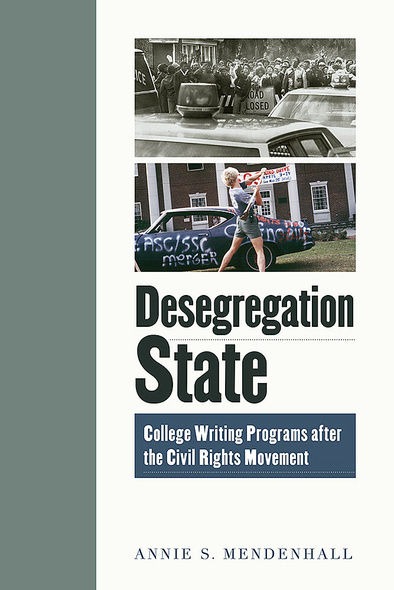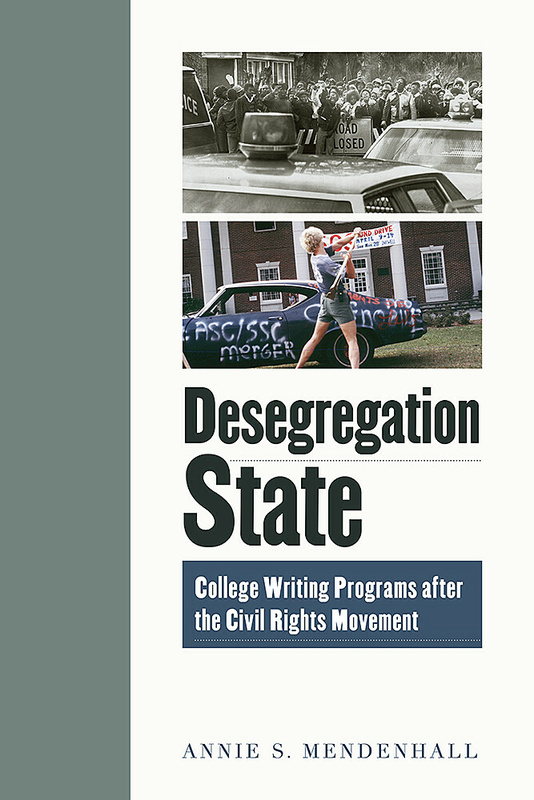Desegregation State
College Writing Programs after the Civil Rights Movement
Utah State University Press
The only book-length study of the ways that postsecondary desegregation litigation and policy affected writing instruction and assessment in US colleges, Desegregation State provides a history of federal enforcement of higher education desegregation and its impact on writing programs from 1970 to 1988. Focusing on the University System of Georgia and two of its public colleges in Savannah, one a historically segregated white college and the other a historically Black college, Annie S. Mendenhall shows how desegregation enforcement promoted and shaped writing programs by presenting literacy remediation and testing as critical to desegregation efforts in southern and border states.
Formerly segregated state university systems crafted desegregation plans that gave them more control over policies for admissions, remediation, and retention. These plans created literacy requirements—admissions and graduation tests, remedial classes, and even writing centers and writing across the curriculum programs—that reshaped the landscape of college writing instruction and denied the demands of Black students, civil rights activists, and historically Black colleges and universities for major changes to university systems. This history details the profound influence of desegregation—and resistance to desegregation—on the ways that writing is taught and assessed in colleges today.
Desegregation State provides WPAs and writing teachers with a disciplinary history for understanding racism in writing assessment and writing programs. Mendenhall brings emerging scholarship on the racialization of institutions into the field, showing why writing studies must pay more attention to how writing programs have institutionalized racist literacy ideologies through arguments about student placement, individualized writing instruction, and writing assessment.
Formerly segregated state university systems crafted desegregation plans that gave them more control over policies for admissions, remediation, and retention. These plans created literacy requirements—admissions and graduation tests, remedial classes, and even writing centers and writing across the curriculum programs—that reshaped the landscape of college writing instruction and denied the demands of Black students, civil rights activists, and historically Black colleges and universities for major changes to university systems. This history details the profound influence of desegregation—and resistance to desegregation—on the ways that writing is taught and assessed in colleges today.
Desegregation State provides WPAs and writing teachers with a disciplinary history for understanding racism in writing assessment and writing programs. Mendenhall brings emerging scholarship on the racialization of institutions into the field, showing why writing studies must pay more attention to how writing programs have institutionalized racist literacy ideologies through arguments about student placement, individualized writing instruction, and writing assessment.
‘A comprehensive historical resource for scholars studying how race and racism affect the way the field works.’
—Alexandria Lockett, Spelman College
‘Essential for the field of rhetoric, composition, and literacy studies and will add important insight to the fields of education broadly and specifically higher education.’
—Kristen Edwards, University of Oklahoma
'An essential read for composition scholars interested in the systemic ways writing programs were informed by desegregation policies.'
—Composition Studies
Annie S. Mendenhall is associate professor and coordinator of first-year writing in the Department of Writing and Linguistics at the Armstrong campus of Georgia Southern University. Her research on the history of composition, labor practices in writing programs, and writing program administration has appeared in College English, Composition Studies, and WPA: Writing Program Administration.





